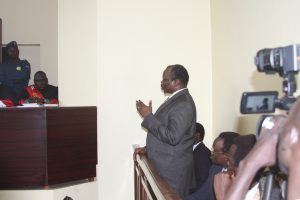By Mogga Emmanuel Benaih.
The suspended SPLM Secretary-General and former chief negotiator of south Sudan on talks with Khartoum , Pagan Amum, who is currently facing treason charges –labeled against him alongside four other top former government by the government told the special court he was not guilty of any of the charges being levied on him.
Pagan Amum who testified in court today denied taking part in any plot to overthrow the government.
“I have no any connection with that group; if they’re those who wanted to stage a coup and overthrow the government, I am not part of them neither in the past, at the present nor will I have any connection with them in the future,” he said.
Mr. Amum, who is the second defendant of the four people accused by the government of attempted coup in December last year, was the second person to testify before the high court in Juba today.
Meanwhile, the lead defense lawyer, Kur Lual Kur, told Eye Radio after Pagan Amum’s testimony that he is confident they will win the case because the charges brought by the prosecutor against his clients are “weak”.
The Prosecutor General James Mayen was not available in the court today for comments.
This was the court hearing number 13.
The trial of the accused started on the 11th of March, and so far nine witnesses out of eleven have testified before the court.
The four defendants are the former Minister of National Security, Oyai Deng Ajak, the suspended Secretary-General of the SPLM, Pagan Amum, the former deputy Minister of Defense, Dr. Majak De Agoot, and the former head of Mission of the Government of South Sudan to the US, Ambassador Ezekiel Lol Gatkoth.
seven of the detainees arrested together with Pagan in connection to the coup plot have been released and are currently under the custody of the Kenyan government.
(additional information from Eye Radio)
The suspended SPLM Secretary-General and former chief negotiator of south Sudan on talks with Khartoum , Pagan Amum, who is currently facing treason charges –labeled against him alongside four other top former government by the government told the special court he was not guilty of any of the charges being levied on him.
Pagan Amum who testified in court today denied taking part in any plot to overthrow the government.
“I have no any connection with that group; if they’re those who wanted to stage a coup and overthrow the government, I am not part of them neither in the past, at the present nor will I have any connection with them in the future,” he said.
Mr. Amum, who is the second defendant of the four people accused by the government of attempted coup in December last year, was the second person to testify before the high court in Juba today.
Meanwhile, the lead defense lawyer, Kur Lual Kur, told Eye Radio after Pagan Amum’s testimony that he is confident they will win the case because the charges brought by the prosecutor against his clients are “weak”.
The Prosecutor General James Mayen was not available in the court today for comments.
This was the court hearing number 13.
The trial of the accused started on the 11th of March, and so far nine witnesses out of eleven have testified before the court.
The four defendants are the former Minister of National Security, Oyai Deng Ajak, the suspended Secretary-General of the SPLM, Pagan Amum, the former deputy Minister of Defense, Dr. Majak De Agoot, and the former head of Mission of the Government of South Sudan to the US, Ambassador Ezekiel Lol Gatkoth.
seven of the detainees arrested together with Pagan in connection to the coup plot have been released and are currently under the custody of the Kenyan government.
(additional information from Eye Radio)

